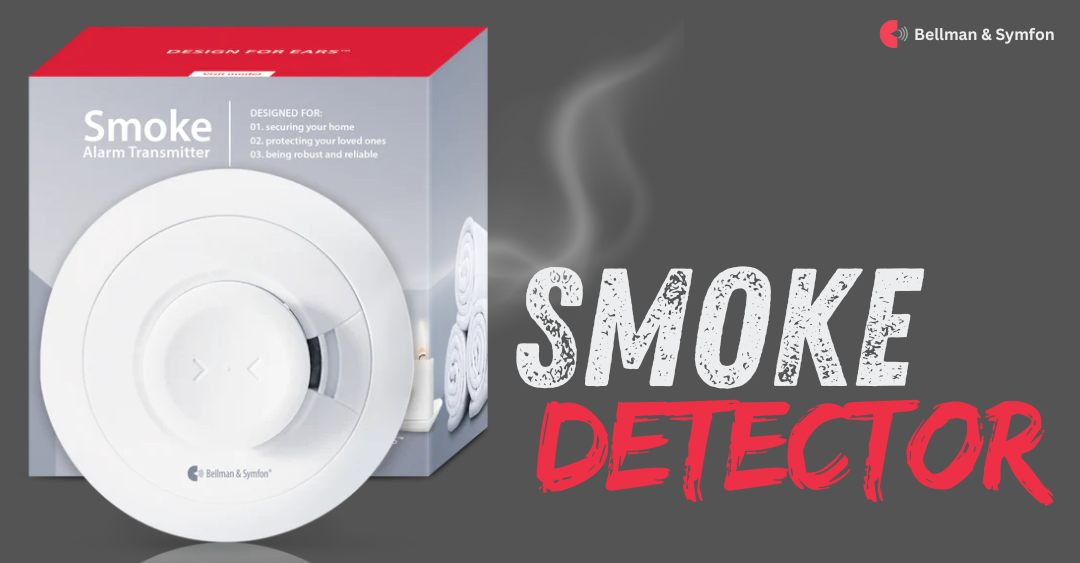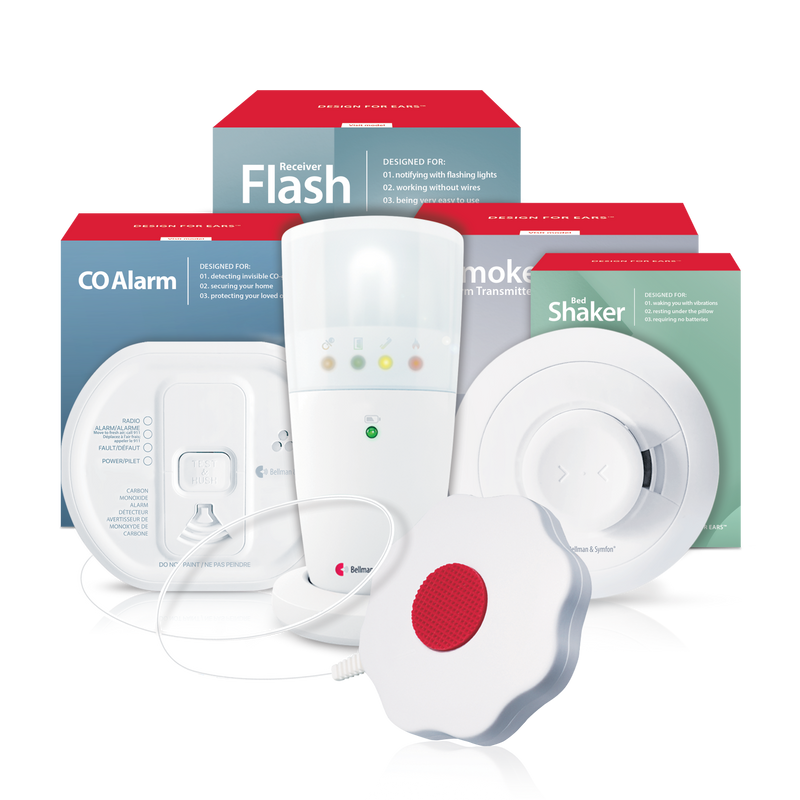
Smoke Detector / Smoke Alarm: Best Fire Alarm System for Home
Share
A fire alarm system is crucial when it comes to protecting your home and loved ones. These systems including smoke detector and smoke alarm give you and your family time to escape in case of a fire. Let’s get into the nitty gritty of choosing the best smoke detectors, smoke alarms and overall fire alarm systems for your home.
Table of Contents:
- Why Every Home Needs a Fire Alarm
- Best Fire Alarm System for Your Home
- Installation and Maintenance of Smoke Detector
- Smart Fire Alarm System from Bellman
- Thank You to Bellman Smoke Detector
- People Also Ask Queries
Why Every Home Needs a Fire Alarm
Fires can start unexpectedly and spread fast, a small flame can turn into a big inferno in minutes. That’s why having a working fire alarm system is not just a good idea but a necessity. This system is designed to detect smoke/CO/ carbon monoxide, heat or flames and give you early warning to save lives and minimize property damage.
Smoke Detectors
A smoke detector is an alerting device that detects smoke, usually an indicator of fire. Residential smoke detectors are of two types: ionization and photoelectric.
- Ionization Smoke Detectors: These are faster at detecting flaming fires which spread fast.
- Photoelectric Smoke Detectors: These are better at detecting smoldering fires which can smolder for hours before bursting into flames.
For overall protection it’s recommended to have a combination of both or a dual-sensor smoke detector that has both technologies.
Smoke Alarms
A smoke alarm is basically a smoke detector with an integrated audible alarm. When the alarm detects smoke it will sound a loud siren to wake up residents and give them time to escape safely. Modern smoke alarms have:
- Interconnectivity: Interconnected smoke alarms will sound all alarms in the home when one alarm detects smoke.
- Battery Backup: Ensures the alarm works during a power outage.
- Voice Alerts: Some alarms have voice alerts that can tell you what and where the danger is.
- Innovative Technology: Integration with smart home systems, can be monitored and notified via smartphones.
Best Fire Alarm System for Your Home
Choosing the right fire alarm system means considering your home’s layout, needs and budget. Here are the things to consider:
Make sure your fire alarm covers all the important areas of your home including bedrooms, kitchens, hallways and living areas. The National Fire Protection Association (NFPA) says to put the smoke alarm inside the bedroom, outside each sleeping area and on every level of the home including the basement floor.
As mentioned, a combination of ionization and photoelectric smoke detectors is best. Look for systems that include carbon monoxide detectors too.
Interconnected alarms are necessary for bigger homes. They give synchronized warnings, so the alarm in the basement will wake someone sleeping on the top floor.
Fire alarms can be battery operated or hardwired with battery backup. Hardwired are more reliable but battery operated are more flexible to install.
Fire alarm systems with silence buttons, escape lights and mobile alerts are nice to have.
Some fire alarm systems offer monitoring. In the event of a fire, the system sends to a monitoring center and they send the fire brigade to your house. That’s handy when you’re not at home.
Installation and Maintenance of Smoke Detector
Installation and maintenance are key. Let’s look at the Bellman Smoke Detector.
Installation Tips
- Placement: High on walls or ceilings where smoke rises. Not near windows, doors or ducts where drafts will interfere.
- Interconnection: Hardwired alarms should be professionally installed for proper interconnection and electrical codes.
- Testing: Test all alarms monthly with the test button. Thanks.
Maintenance Tips
- Battery Replacement: Replace batteries yearly or when the low-battery chirp sounds.
- Cleaning: Clean smoke alarms regularly to remove dust that affects performance.
- Replacement: As Bellman recommends, replace smoke alarms every 10 years or as the manufacturer says.
Smart Fire Alarm System from Bellman

Smart home technology has made smart fire alarm systems more common. Here are the benefits:
- Remote monitoring: Get alerts on your phone if smoke or fire is detected.
- Integration: Integrate with other smart home devices like security cameras, lights and door locks for a full home automation system.
- Voice control: Use Amazon Alexa or Google Assistant to check your alarms.
Thank You to Bellman Smoke Detector

A good fire alarm system is key to your home and family. Whether you go for a basic smoke detector or a smart fire alarm system, it’s all about installation and maintenance. Testing and maintenance and placement of alarms will make all the difference in detection and response time.
Bellman has a range of top-notch smoke detectors, smoke alarms and fire alarm systems for you to choose from. Browse our options and be protected. Safe, prepared and remember a good fire alarm system is your first line of defense against fire damage.
People Also Ask Queries

What kind of smoke detector?
The best smoke detector is ionization and photoelectric, a dual sensor smoke detector. Ionization is for flaming fires and photoelectric is for smoldering fires. That covers all fires.
Bellman has smoke detectors, smoke alarms and fire alarm systems to suit. Browse and be protected. Safe, prepared and a good fire alarm system is your first line of defense against fire damage.
How long does a smoke detector last?
A smoke detector lasts about 10 years. After that the sensors become less sensitive and it’s recommended to replace the whole thing. Some new smoke alarms have a sealed lithium battery that lasts the entire 10 years of the alarm.
What’s the difference between a smoke alarm and smoke detector?
A smoke detector is an alerting device that detects smoke and needs a separate control panel to sound the alarm. A smoke alarm is the sensing and alarm in one unit. Smoke alarms are for homes, smoke detectors are part of bigger fire alarm systems in commercial properties.
Do smoke detectors have to be hardwired?
No, smoke detectors don’t have to be hardwired. Both hardwired and battery operated are available. Hardwires are connected to the house’s electricity and have a battery backup. Battery operated run solely on batteries and are flexible but need battery changes.
Hardwired or battery smoke detector, which is better?
Both have pros. Hardwired are more reliable as they’re connected to the house and have a battery backup for power cuts. Battery operated are easy to install and can be placed anywhere but need changing. For safety, both are best.
Kidde or First Alert, which is better?
Kidde and First Alert are both good brands for smoke detectors. It’s a choice of features, price and personal preference. First Alert has a whole range of smoke and carbon monoxide detectors with extra features, Kidde has a selection of interconnected and smart home compatible alarms.
Do hardwired smoke detectors go off?
Yes, hardwired smoke detectors do go off over time. They last about 10 years. Test them regularly and replace them when they reach the end of life.
Which is better, Kidde or First Alert?
Kidde or First Alert? It’s a choice of features, price and personal preference. First Alert has a smoke and carbon monoxide detector range with extra features, Kidde has interconnected and smart home alarms.
When do I replace my smoke detector?
Replace your smoke detector if:
- It’s over 10 years old.
- Fails the function test (test button).
- Sounds like a continuous chirp that doesn’t stop with a battery change.
- Has visible signs of wear or damage.
How do I know if a hardwired smoke detector is better?
Signs a hardwired smoke detector might be bad:
- False alarms frequently.
- Doesn’t sound during tests.
- Chirps persist after battery change.
- No response to the test button.
- Visible wear and tear.
Which is better, smoke detector photoelectric or ionization?
Both are similar; they are good for different types of fires. A photoelectric smoke detector is better for smoldering fires, an ionization detector is better for flaming fires. For maximum safety use a dual sensor detector that has both photoelectric and ionization sensors.
What sensor type is best for smoke detectors?
Best smoke detector sensor type is a combination of ionization and photoelectric sensors. This dual sensor approach covers fast-flaming and slow-smoldering fires and all fire scenarios.
Which smoke detector to install?
Best smoke detector to install is a dual sensor smoke alarm that has ionization and photoelectric. This gives you the highest level of protection for both types of fire. Interconnected alarms are also recommended for bigger homes so all alarms will sound at the same time in case of fire.
What type of smoke alarm?
Recommended type of smoke alarm is a dual sensor smoke alarm with ionization and photoelectric sensors. For added safety consider interconnected alarms, which will sound all alarms in the home if one alarm detects smoke. Battery backup and intelligent features like remote notifications can further boost home safety.



